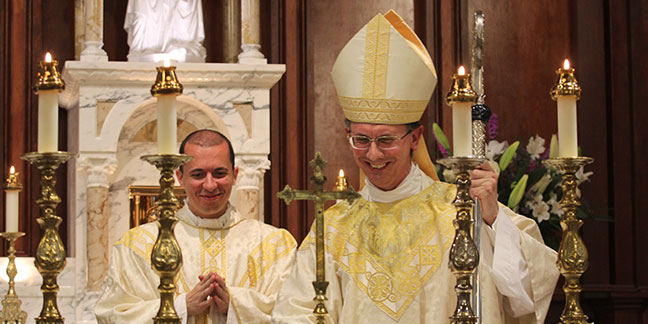 TRYON — Father Jason Christian was installed Aug. 6 as pastor of St. John the Baptist Church – his first assignment as a pastor for the Diocese of Charlotte.
TRYON — Father Jason Christian was installed Aug. 6 as pastor of St. John the Baptist Church – his first assignment as a pastor for the Diocese of Charlotte.
The former parochial vicar of St. Michael Church in Gastonia, Father Christian is also the academic dean for the 21 men studying at St. Joseph College Seminary in Charlotte.
During the installation rite at the start of the Mass, Deacon Art Kingsley read aloud Father Christian’s official letter of appointment. Bishop Peter Jugis and the congregation then witnessed Father Christian make his profession of faith, renew his oath of fidelity to the Church, and sign the official Church documents of his new office.
His documents were witnessed by Father Patrick Winslow, pastor of St. Thomas Aquinas Church in Charlotte, a former pastor of Father Christian's and a former pastor of the Tryon parish.
Father John Putnam, pastor of St. Mark Church in Huntersville; Father Matthew Buettner, spiritual director of St. Joseph College Seminary; and Father Jason Barone, promoter of vocations for the Diocese of Charlotte, were present. Father Matthew Kauth, rector of St. Joseph College Seminary, served as master of ceremonies for the installation Mass.
During his homily, Bishop Jugis welcomed everyone who attended the installation Mass and expressed his joy in seeing a full church during the standing-room-only Mass.
He also took time to carefully explain Father Christian’s new responsibilities as pastor, emphasizing that a pastor must do three primary things: teach, sanctify and lead his parishioners.
“What is the mission of the pastor?” Bishop Jugis asked. “The mission of a pastor is to prepare you for eternal life. The mission of a pastor is salvation… You are his mission.”
The letter of appointment read at the beginning of the Mass further describes in detail what that duty entails, the bishop said: the office of teaching, the office of sanctifying and the office of pastoral governance are broken down.
“In the office of teaching…ultimately the pastor is in charge of what is brought to the faithful of the parish,” Bishop Jugis explained.
He noted that Father Christian making his profession of faith at the beginning of the Mass was done so that all would know that he will present the unadulterated faith of the Church which has been passed on by the apostles from Jesus Himself.
At his installation Mass, the pastor – not the deacon, as is usually the case – proclaims the Gospel, the bishop noted. That signifies that the pastor is ultimately in charge for the proclamation of the Gospel message to the people of his parish.
Through the devout and reverent celebration of the sacraments, a pastor provides his people with the sacraments, especially the Eucharist.
“He is in charge of the sacramental and spiritual life of the parish,” Bishop Jugis pointed out.
A pastor is also charged with the office of pastoral governance, to make sure that parish life and all of its ministries are well organized, harmoniously working together and that everything is in good order in the parish, the bishop continued.
He then reminded Father Christian of an important line in the appointment letter: "The model for your pastoral ministry is the Good Shepherd Himself, Jesus."
“So keep bringing everything back to Jesus,” he told the young priest, who he had ordained in 2013. “He is the model that the pastor follows, whether it be the office of teaching, the office of sanctifying or the office of pastoral governance.
“Jesus is the model. Jesus is front and center and everything comes from Him.”
— SueAnn Howell, senior reporter. Photos by SueAnn Howell and Giuliana Riley.
















